Dentures Simpsonville
High-Quality, Natural-Looking, Brand-New Smiles
If you’ve lost a significant number of teeth, you need to find a high-quality replacement sooner rather than later. Dentures have long been trusted to fill in the gaps after the loss of multiple teeth, and they have never been more effective than they are today. Your dentist at Tylan Creek Family Dentistry offers full and partial dentures in Simpsonville, SC. Keep reading to learn more about this popular tooth replacement method.
Why Choose Tylan Creek Family Dentistry for Dentures?
- Enhanced Digital Imaging
- Natural-Looking Materials Used
- Multiple Dentists Ready to Help
Why Tooth Replacement is Crucial
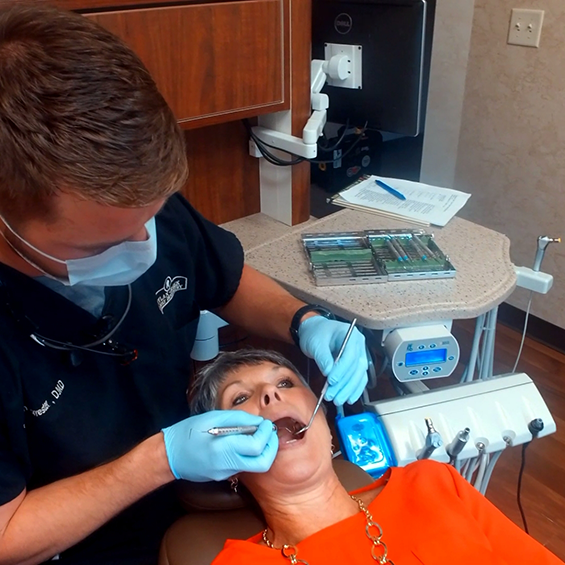
After tooth loss, finding a tooth replacement that’s comfortable and fits well is important for your continued health and well-being. Without all your teeth, it may be difficult to eat the nutritious foods that keep you healthy and feeling great for a long, happy life. Your remaining natural teeth may drift out of alignment, putting you at a greater risk of teeth grinding while also experiencing painful problems with your jaw. Speech can also become difficult, and your self-confidence will likely suffer, too.
Dentures offer a wealth of benefits after tooth loss. They include:
- Highly customizable for a natural-looking solution
- Fixed and removable options are available
- Restored ability to eat, speak, and smile with confidence
- Support oral and overall health
Benefits of Dentures

When you’re missing multiple teeth, it can be challenging to complete daily tasks, like eating, speaking clearly, and smiling with confidence. Dentures are a life-changing tooth replacement option for people who are missing several, most of, or all of their teeth because of the restoration’s ability to improve quality of life. If you have been a victim of tooth loss, dentures can give your smile another chance. Here are just some of the endless benefits you can experience.
Psychological Benefits

People who are missing teeth can experience a variety of psychological downsides. Where there are obvious gaps, it’s common to feel self-conscious. This can make it more difficult to engage in social activities. By restoring the appearance and function of your smile with dentures, you are likely to experience an increase in confidence. Ultimately, dentures can reduce anxieties surrounding appearance, speech articulation, chewing ability, and more!
Clearer Enunciation

Without a complete smile, it can be much more difficult to speak. To pronounce words, your lips and tongue need to be positioned properly. Without being able to touch your tongue to your teeth, some words become very difficult to say. By replacing your missing teeth with dentures, you will be better able to enunciate more clearly when speaking. After a short adjustment period and a little bit of practice, speaking will come naturally.
Improves Nutrition
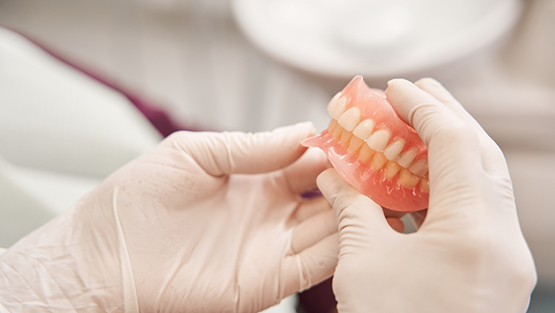
Many nutritious foods are tough in texture. This includes fruits, vegetables, and healthy proteins. When you can’t chew your food thoroughly, you can experience things like indigestion and malnutrition. With an improved ability to chew, dentures allow for a more expansive diet full of nutritious foods. In the end, your body will receive more of the essential nutrients it needs to optimize your health.
Preserves Oral Health
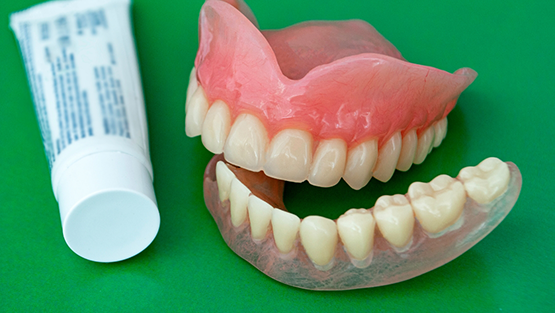
If you still have some healthy teeth, dentures can help to keep them from shifting around to other areas of the mouth. Also, dentures help to bear the pressure of chewing, therefore reducing the wear and tear of the existing teeth.
Expands Opportunity
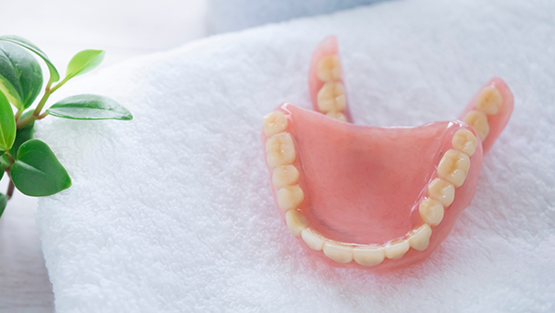
Your smile is one of the first things people notice about you. When it comes to job interviews to getting promotions, it’s crucial that you make a great impression. A complete smile is certainly an advantage. When you feel more confident about your appearance, it will show in the way that you present yourself. That could mean greater opportunities in your professional and personal life.
Types of Dentures

Whether you’ve lost all of your teeth in the upper or lower jaw, or your dentist has recommended extraction, a full (complete) denture can take the place of an entire row of missing teeth. It is held in place using natural suction; a denture adhesive may provide additional security for a complete denture.
A partial denture fills in the space left by missing teeth when several healthy ones are still present in the gumline. It fits in like a missing puzzle piece, held in place with small clasps or brackets attached to the natural teeth.
Dental implants from your dentist in Simpsonville can also be used to retain a full or partial denture. Eligible candidates are those who are healthy enough to heal from a surgical procedure. People who can benefit from dental implants should strongly consider the option. They provide unmatched stability and security for a partial or complete denture.
Getting Used to Your Denture

It may take some time to adjust to your new tooth replacement, but with a little perseverance, you’ll soon adjust and be enjoying all the benefits of a complete and confident smile once again. Wear your denture as directed to help your mouth get used to the way it feels. Excessive saliva production may occur right at first -- that’s just your body’s reaction to a new object. It should subside after a week or two. Practice reading out loud and take small bites to get used to speaking and eating. If you still can’t seem to adjust to your denture after several weeks, or if it is causing you pain, don’t hesitate to get in touch with your dentist. You may need a small adjustment or refitting.
Understanding the Cost of Dentures
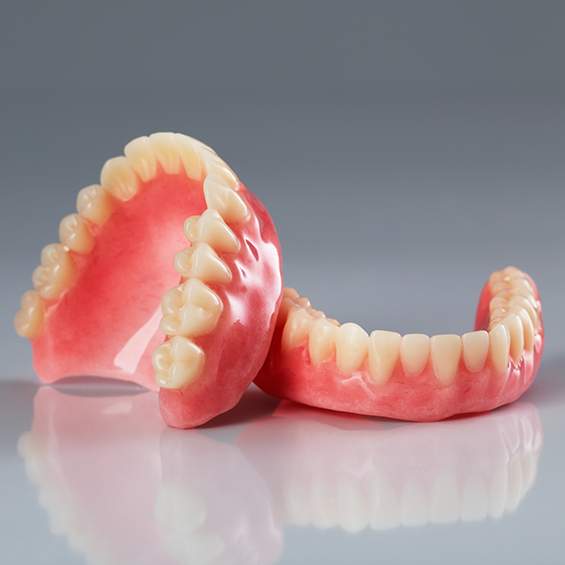
Your financial situation should never prevent you from enjoying a complete smile. Although various factors affect the cost of dentures in Greenwood, we strive to keep them affordable for everyone. Every mouth is unique, so there's not a flat rate for a new set of teeth; however, we'll create the high-quality denture you deserve without breaking the bank.
Factors That Affect the Cost of Dentures
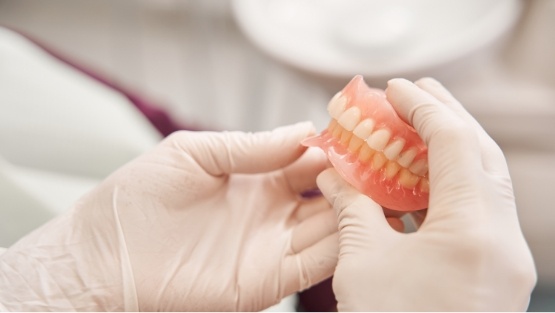
No two mouths or situations are the same, so it’s impossible to have a one-size-fits-all denture. There’s no way to know how much you’ll have to pay without first scheduling a consultation with your denture dentist in Greenwood. After examining your mouth and learning more about your preferences, they’ll create a personalized treatment plan, which will include an estimate. Although every case differs, you can expect it to include:
- Preparatory Procedures: Many patients need a little prep work before getting dentures, like tooth extractions or gum disease therapy.
- Number of Arches: Treating both arches will increase the cost.
- Type of Denture: You have several styles to choose from, like traditional or implant dentures.
- Materials: Discounted materials may save money upfront, but you’ll pay in terms of quality.
We will review your estimate and payment options, so you will know exactly how much you will need to pay before committing to anything.
Are Implant Dentures More Expensive?
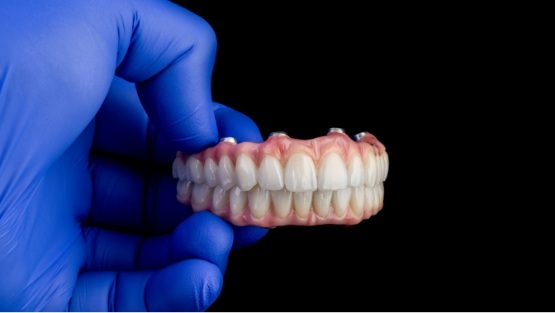
Implant dentures can cost more initially, but they are the most affordable long-term. Regular dentures last for 5 to 7 years before needing replacement. Implant dentures can thrive for 30 years or longer with the right maintenance. As a result, they can pay for themselves, eventually. You will also save money on reduced oral health expenses. A dental implant is the only method of stopping bone loss in your jaw. A strong jawbone will keep your smile healthy, so you are less likely to need treatment later. As the next best thing to your real teeth, you will enjoy priceless benefits to improve your quality of life.
Does Dental Insurance Cover Dentures?

Dentures in Greenwood are considered a major service. Therefore, it is unlikely your dental insurance will pay the entire cost, but you can use your coverage to offset the amount you pay. After meeting your deductible, your policy may pay 50% to 80% of the cost of the prosthetics. You can also use your benefits for other steps in your treatment plan, like the consultation, tooth extractions, or imaging.
Other Options for Making Dentures Affordable
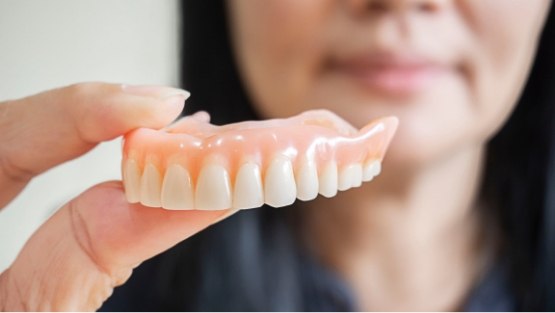
We will review all your payment options during your consultation, which include:
- Traditional Payments: We accept cash, checks, and credit cards.
- in-House Savings Plan: A membership fee gives you access to reduced rates for common dental services.
- Third-Party Financing: After your credit approval, you can pay for your dentures using monthly installments through a third-party financing company, like CareCredit.
You can restore a beautiful, confident smile with dentures. We will help you replace your missing teeth, even if money is tight.
Dentures FAQs
Will It Hurt to Get Dentures?
If you received implant dentures or had teeth extracted before getting your dentures, you’ll likely feel some residual soreness for a few days following your oral surgery. As long as you take your prescribed pain medication as directed, any discomfort should subside after about three to five days.
When your dentures are first placed, you may experience some minor irritation as your mouth gets used to the new appliance. This adjustment period lasts a different amount of time for everyone; for some people, it can take up to several months.
How Long Will You Have to Wait to Get Dentures After Your Teeth are Pulled?
The average wait time between tooth extractions and denture placement is six to eight weeks, but this timeline varies based on the type of denture you’re receiving. Waiting this long gives your gums time to heal, ensuring that your dentures fit correctly.
For implant dentures, you may have to wait three to six months for osseointegration (the process of the implants fusing to your jawbone) to occur. In some cases, a temporary denture can be placed on the same day as your implant surgery, but you’ll have to wait to receive your permanent set of teeth.
Can I Sleep with My Dentures?
Unless you have a fixed denture that’s designed to stay in your mouth at all times, we strongly recommend taking your dentures out before going to bed. After the pressure of holding the dentures in place all day, your gum tissue and jawbone need time to rest. Plus, nighttime is the perfect opportunity to let your dentures soak in a cleaning solution and remove any food debris, bacteria, or plaque that has built up throughout the day. Remember to only let your dentures soak in room-temperature or cool water or denture cleanser. Hot water (or letting them dry out) can change their shape.
Can I Use Regular Toothpaste to Clean My Dentures?
While your dentures should be brushed and rinsed daily, we advise against using ordinary toothpaste. Toothpaste is actually abrasive and can leave microscopic scratches on the surface. In the same vein, you shouldn’t use a hard- or medium-bristled toothbrush. Always use a soft-bristled brush specifically designed for cleaning dentures. They can be cleaned with denture cleansers as well as mild dishwashing liquid or hand soap. Try to clean your dentures, or at least rinse them off, after every meal and snack.
